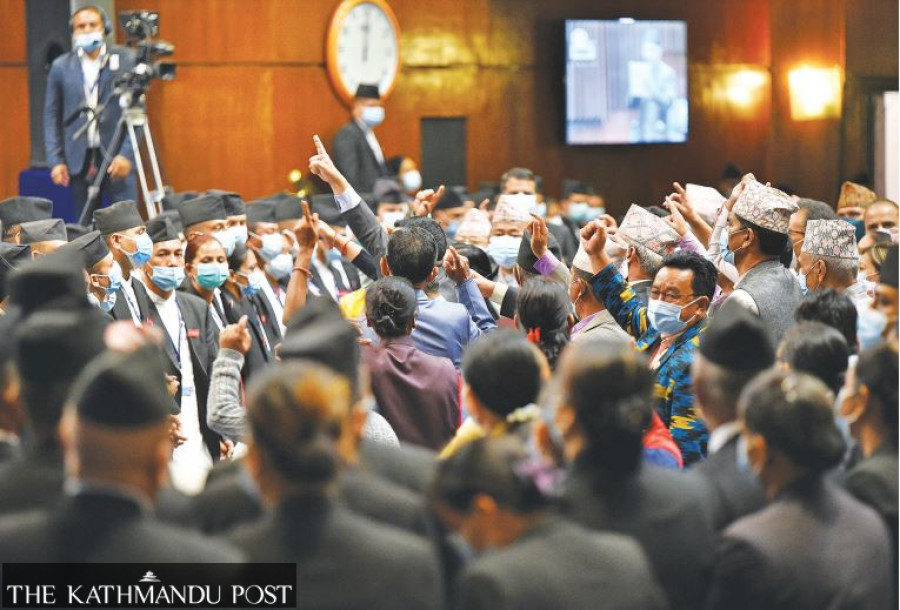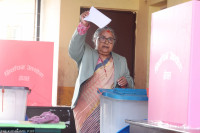Politics
UML continues Parliament obstruction as KP Oli pitches for early elections
Experts argue that UML has challenged the Speaker’s move in court so it should wait until the court gives its verdict.
Binod Ghimire
Ever since the ongoing session of the House of Representatives commenced three weeks back, every meeting has started off with a request from Speaker Agni Sapkota to the main opposition, CPN-UML, to allow the House to function smoothly. Eight meetings of the House of Representatives have been held so far and all of them were disrupted by the main opposition.
The CPN-UML on August 17 had recommended Sapkota to strip 14 lawmakers of the party’s dissident Madhav Nepal faction of their positions. Thirteen days later Sapkota on August 29 said it was not necessary to take action against them, as they had formed the new party, CPN (Unified Socialist).
Dissatisfied with Sapkota’s inaction, the UML has been disrupting all the House meetings.
Except for passing three bills related to the budget, both the houses of the federal parliament have remained largely ineffective ever since the first meeting convened on September 8. There are over 55 bills pending in Parliament some of which were awaiting approval from its very first meeting.
“Our obstruction will continue unless the Speaker gives a solution. However, neither the Speaker nor the government is willing to negotiate and resolve the matter,” Bishal Bhattarai, chief whip of the UML, told the Post. “It seems it is up to the Supreme Court to resolve the matter.”
UML chair KP Sharma Oli has filed writ petitions challenging the Speaker’s decision and they are sub judice.
The next meeting of the House of Representatives has been slated for Thursday. With no sign that the main opposition will clear the obstruction, there aren’t any serious agenda for the meeting. Presentation of the report by the Office of the Auditor General and informing the House about the decision to repeal the ordinance are only two brief tasks the lower house will perform on the day.
On the one hand, the UML has been disrupting the lower house and on the other, the party leadership has been claiming that the country needs to go for fresh elections, claiming that the House of Representatives is not effective.
“The House of Representatives is not functioning. We need a fresh mandate,” Oli said in an interaction with the editors and reporters from the different media on Tuesday. “I reiterate that the country must go for a fresh mandate.”
The erstwhile Oli government dissolved the House of Representatives twice on December 20 last year and May 21, but the Supreme Court overturned the dissolution on both occasions terming them unconstitutional.
When the Supreme Court on February 23 reinstated the House for the first time, it made it mandatory to commence the meeting of the lower house of Parliament by the first week of March.
Though the meeting of the reinstated House commenced on March 7, the session ended without endorsing a single bill. The Oli government in an attempt to prove Parliament irrelevant never provided business to the House. The session of the House of Representatives was ended abruptly and it consequently faced dissolution.
Political experts question the intention of the continuous House obstruction by the UML lawmakers. They say it seems the obstruction is largely aimed at proving the House irrelevant, thereby pushing the country to early elections.
“It is clear that UML is trying to create a situation for early elections. The recent statements from Oli are the evidence of it,” Daman Nath Dhungana, a former Speaker and a civil society leader, told the Post. “The Nepali Congress wants the same. We cannot rule out a tacit understanding between the ruling party and the main opposition on the issue.”
Political experts say the UML disliked Parliament when it was in the government and this tendency continues even after the party was consigned to the opposition benches.
They argue that if the party has challenged the Speaker's move in court it should wait until the court gives its verdict.
Rajendra Maharjan, a political commentator who writes for Kantipur, said the UML should abide by the existing constitutional and legal provision instead of holding the House hostage.
Rule 21 of the National Assembly and House of Representatives Regulations say the decisions by the chair or the Speaker cannot be questioned while Article 105 of the Constitution of Nepal bars the federal parliament from holding discussions on sub judice cases.
“The UML is deliberately obstructing the House to show that it lacks relevance. It is only weakening the parliamentary system,” he told the Post. “The obstruction of the House is very much targeted at creating an environment for early elections.”




 27.41°C Kathmandu
27.41°C Kathmandu













